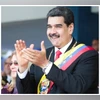Griselda Ascanio keeps an improvised wood-burning stove ready in her backyard in Maracay, 120 kilometers (75 miles) from Venezuela's capital, for the frequent gas-supply interruptions that make it difficult to cook.
"We cannot just cry about it," said the 44-year-old administrator, who collects branches that fall from trees. "So we have learned to solve problems ourselves." While it sits atop the world's eighth-largest natural gas reserves and the biggest in Latin America, Venezuela ranked last year as the 25th-largest global producer, according to the Energy Institute's Statistical Review of World Energy.
The South American country's output fell to 4 billion cubic feet per day (bcfd) this year from almost 8 bcfd in 2016, data from consultancy Gas Energy Latin America shows.
A production revival is urgent not only because it would assure more reliable domestic supply, but also because it could ease shortages emerging in neighboring countries while bringing Venezuela much-needed hard-currency revenue.
The gas problem is a key issue as a presidential election approaches on July 28. Whoever wins faces the daunting task of securing investment in the OPEC member's gas industry.
President Nicolas Maduro's administration has doubled down on offering gas projects to foreign companies since last year, but longstanding unpaid debts to many of the companies, US sanctions and the enormous investments required have limited progress.
The main opposition coalition, represented by Edmundo Gonzalez in the voting, has proposed radically expanding the private sector's role, while restructuring the country's $150-billion debt, something analysts say would take years.
More From This Section
"Nobody is going to massively produce gas in Venezuela in these conditions, but where there is immediate interest is in small-scale midstream projects," said Antero Alvarado, managing partner of Gas Energy Latin America, referring to pipelines and systems to better capture and distribute gas.
Venezuela's problems have hampered development, leading to frequent scarcity of the fuel essential for cooking, generating power and feeding petrochemical plants and factories.
The gas Ascanio intermittently receives at her home arrives in cylinders whose distribution is controlled by government-supported groups. That subsidised propane is among the most expensive fuels PDVSA's refineries produce. Sometimes, the state-owned company even resorts to importing that gas.
Neighbors from Colombia to Brazil and Trinidad and Tobago, and many European nations, are hopeful that Venezuela's production could eventually ease their own gas shortfalls. They have pressured the Biden administration to grant gas projects exemptions from sanctions, company executives and government officials have said.
PDVSA and its gas subsidiary did not reply to requests for comment.
Flaring the gas away
Venezuela's almost 200 trillion cubic feet (tcf) of proven gas reserves are mostly untapped.
"Venezuela's natural-gas production has historically been limited in comparison to its potential," the US Energy Information Administration said in a February report, attributing the situation to a poor investment climate, lack of infrastructure and inability to develop projects.
Some 80% of Venezuela's gas output is associated with crude production.
In the last five years, unprocessed gas flared into the atmosphere during oil production has surpassed volumes sold commercially, turning the country into one of the world's largest natural-gas flarers, according to the EIA.
Maduro's socialist government has held inconclusive talks with European companies including Repsol, Eni and Shell, about a capital-intensive project to recapture up to 1.5 tcf of flared gas for the domestic market and exports.
Offshore, large gas exploration and production projects remain mostly stalled, especially the massive 12-tcf Mariscal Sucre. Only one of its four fields is in active negotiation between the government and energy firms Shell and Trinidad and Tobago's NGC for a joint development that could see first output late next year.
Helped by a flexible law that requires less red tape for gas projects than for oil projects, Venezuela's government has begun internal talks to offer a second field, Rio Caribe, for foreign investment, according to sources familiar with the plan.
A 20-year Venezuelan license to develop a 1-tcf gas field that extends into Trinidad's waters, involving BP and Trinidad's NGC, was granted on Wednesday following a US authorisation for the project in May.
"We are making a monumental step in the right direction," said President Nicolas Maduro during the signing ceremony, broadcast by state television station VTV.
Oil Minister Pedro Tellechea has said doors are open to foreign investors following individual licenses Washington recently resumed issuing for specific developments in Venezuela.
But many gas producers in Venezuela no longer have the means to ramp up production unless PDVSA first repays debts, company executives said.
Another way
In what would be a policy U-turn, the opposition wants to reopen the energy industry to foreign investment through privatisation while limiting PDVSA's role and restructuring debts, including paying some creditors with oil.
The strategy would break with two decades of nationalisation that has concentrated almost all production, transportation, processing and sales in the state's hands, creating a long chain of debts among state-owned companies.
"The country will need more electricity, hence, more gas," Alvarado said. "If a privatisation in the power sector happens, there will be economic incentives to produce gas for domestic sales, while larger offshore projects could focus on exports even through LNG (liquefied natural gas)."
(Only the headline and picture of this report may have been reworked by the Business Standard staff; the rest of the content is auto-generated from a syndicated feed.)

)